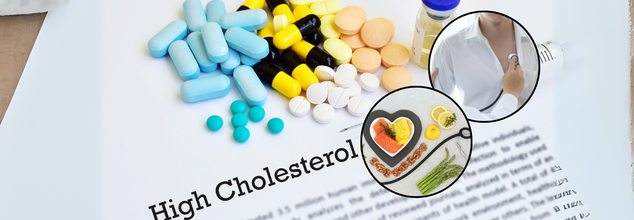- Health Conditions A-Z
- Health & Wellness
- Nutrition
- Fitness
- Health News
- Ayurveda
- Videos
- Medicine A-Z
- Parenting
- Web Stories

Credits: Instagram/ @tahirakashyap
Tahira Kashyap's Cancer Relapsed: Why Do Some Cancers Return?
"Round 2 for me." Tahira Kashyap, a filmmaker, an author, and a breast cancer survivor, has recently shared a personal update on breast cancer relapse. Her breast cancer has returned after seven years. She is married to Bollywood actor Ayushmann Khurrana and was first diagnosed with breast cancer in 2018. Her update on her cancer relapse came on World Health Day, where she posted on her Instagram about her "Round 2".
What Is Cancer Relapse?
Often called cancer recurrence, it is the condition when, even after removal and treatment, cancer returns. It may resurface in the same area where it was first found or turn up at another spot in the body.
There are three types of cancer relapses or recurrence:
Local Recurrence: This happens when the cancer returns in the same spot.
Regional Recurrence: This refers to the original cancer that shows up in tissue or lymph nodes near the original site.
Distance Recurrence: This refers to the cancer that has been found in tissue away from the original location.
Why Do Cancers Come Back?
As per Cancer Research UK, cancer may come back some time after the first treatment for different reasons.
The original treatment may not have gotten rid of all the cancer cells, and those left behind may have grown into a new tumor. In some cases, some cancer cells could also spread elsewhere in the body and start growing there to form a tumor.
Cancer can also come back after surgery because some cancer cells could have been left behind during the operation. In many cases, some cancer cells which had already broken away from the primary cancer could be too small to see to be removed. They are called micro metastases.
Can Cancer Recurrence Be Treated?
Many local or regional cancer recurrences can be treated successfully. Even if a cure isn’t possible, treatment can often shrink the cancer, slowing its growth. This may relieve symptoms, reduce pain, and potentially extend your life.
Your treatment choices will depend on many of the same factors you considered during your initial treatment—your goals, what you hope to achieve, and the side effects you're prepared to manage. Your doctor will also look at the treatments you've had before and how your body responded to them.
You might also want to explore clinical trials, which can give you access to the latest or experimental therapies. Talk to your healthcare provider to find out if any trials are available and suitable for you.
How To Know If Your Cancer Is Back?
As per the American Cancer Society, cancer care does not end when you finish treatment. You continue to see your health care team and follow up for care. It is important that you plan your follow-up care after cancer to ensure that your cancer recurrence can be diagnosed within time.
A follow-up care plan is usually based on the medical guidelines for your specific type and stage of cancer. It can also help you feel more in control as you go back to your everyday life after the treatment.
For Tahira, too, the follow-up is what ensured that her recurrence of cancer was detected. In her Instagram post, she wrote: "Seven year itch or the power of regular screening- it is a perspective, I had like to go with the latter and suggest the same for everyone who needs to get regular mammograms. Round 2 for me... I still got this."

Credits: Canva
Short Sleep Is Harmful For Your Brain, But Oversleeping Could Be Even More Dangerous
Sleep isn't simply a nightly routine, it's an important pillar of health that dictates everything from mood and energy levels to memory and brain structure. Although the risks of short sleep are well-known, increasing research indicates that sleeping too much is equally, if not more, troubling when it comes to the long-term health of your brain.
A recent study by Professor Jianfeng Feng at the University of Warwick has put forward a new understanding of the sleep-health connection: short and long sleep durations are both biologically different patterns with differing, but significant, risks to mental, emotional, and physical health. The results are a wake-up call for the way we consider our sleep behaviors—not only how much we're lacking, but how much we might be overdoing it.
The study team looked at data from about 500,000 UK Biobank adults aged 38 to 73 and measured how their sleep time corresponded to brain structure and function. Study participants were divided into short sleepers (fewer than 7 hours) and long sleepers (longer than 7 hours), with their brain imaging, genetic information, and health outcomes compared.
Short sleepers had less brain matter in areas of emotional regulation and complained of more depression symptoms, tiredness, and muscle-skeletal complaints.
Long sleepers, on the other hand, exhibited signs of more loss of brain matter in areas of memory, worse metabolic health, increased inflammation, and more risk markers for cognitive decline, Alzheimer's disease, and schizophrenia.
Professor Feng said, "Short sleep is usually an underlying cause of illness, while long sleep tends to be indicative of pre-existing conditions." Simply put, long sleep won't necessarily lead to disease—it could be an early warning sign for them.
Why Oversleeping Is a Red Flag, Not a Luxury?
Sleeping nine or more hours a night on a regular basis—and still feeling tired—is medically referred to as hypersomnia. Unlike occasional weekend lie-ins, hypersomnia signals something deeper. Individuals often report hitting snooze repeatedly, waking up unrefreshed, and struggling with concentration or memory throughout the day.
As per recent evidence in JAMA Neurology, long sleepers scored significantly worse on cognitive assessments such as the Digit Symbol Substitution Test (DSST) and self-reported lower cognitive abilities. The relationship was strongest in older populations, where sleep for more than 10 hours per night was associated with increased risks for dementia and cognitive disorders.
This inverted U-shaped relationship between sleep length and brain functioning—where too little and too much sleep are both associated with worse results—is repeatedly confirmed by various studies.
Oversleeping and Mental Health
Oversleeping isn't only a sign of cognitive problems—it's also associated with mental health. Hypersomnia and depression tend to go hand in hand. About 15% of people with major depressive disorder describe oversleeping as a symptom. Others use excessive sleep as a defense against emotional pain, but it boomerangs. Prolonged sleep worsens depressive symptoms and impairs daytime functioning, creating a vicious cycle.
One big study of more than 24,000 U.S. adults discovered that those who slept more than 10 hours a day had a greater incidence of psychiatric disorders and higher psychological distress. These individuals also had higher rates of early life trauma and unhealed emotional wounds, indicating more profound psychological underpinnings for chronic oversleeping.
Cardiovascular, Metabolic and Inflammatory Risks
The physical health consequences of excessive sleeping are just as disturbing. The American Heart Association research published in Circulation reported that long sleepers had as much as a 50% increased risk of cardiovascular mortality, especially among patients with coronary artery disease.
Oversleeping also leads to:
- Obesity and Type 2 diabetes
- Increased BMI and greater cholesterol imbalance
- Higher pro-inflammatory markers such as C-reactive protein (CRP) and interleukin-6 (IL-6), which are linked to systemic inflammation and risk of disease
Dr. Arshed Quyymi, director of Emory Clinical Cardiovascular Research Institute, highlights the risk: "There is almost a 40 to 50% higher risk of dying if you are sleeping too little or too much."
What is the U-Shaped Curve?
Many meta-analyses reproduce the U-shaped relation between sleep and cognition. Severe durations at both extremes of the curve have been related to increased brain aging. More sophisticated findings, however, indicate that short and long sleep may have an impact on various cognitive abilities. For instance:
Short sleep has a damaging effect on attention, emotional processing, and working memory
Long sleep is related to impairment of decision-making, processing speed, and executive function
These observations highlight the need for individually tailored sleep advice, considering both patient-specific genetic, psychological, and physiological factors.
How to Identify and Address Oversleeping?
So, what can you do if you think you're sleeping too much? Begin by assessing whether this habit has continued for longer than 6-8 weeks and whether you continually feel un-rested after "enough" hours. Prolonged hypersomnia should trigger a visit to a sleep specialist or healthcare provider to exclude underlying causes such as sleep apnea, depression, or thyroid disease.
At-home remedies to reset your sleep habit are:
- Implementing a consistent wake-up time even on weekends
- Positioning the alarm in an inaccessible location to deter snoozing
- Prioritizing early morning activities such as a walk or breakfast rendezvous
- Brushing teeth and washing face the moment you wake up
- Prohibiting returning to bed after rising
- A well-organized, deliberate morning routine can facilitate a stronger, healthier circadian rhythm and better daytime alertness.
Sleep is a keystone of mental and physical well-being, but moderation is required. While chronic sleep loss can impair emotional control and cardiovascular health, routine sleeping too much can herald early neurological deterioration, inflammation, and concealed psychological anguish.
Health professionals are now urging us to shift our way of speaking about sleep—not just about avoiding too little, but about recognizing the dangers of too much. Individualized sleep profiles, according to age, lifestyle, and medical conditions, could provide the best way forward.
If you’re waking up tired every day despite long hours of sleep, it may not be rest your body is craving—it may be time for a deeper health check-in.

Credit: Canva
Amid Rising Indo-Pak Tensions, Here's How You Can Manage Your Anxiety
India launched massive strikes on terror camps in Pakistan and PoK late night yesterday. The aerial operation came in response to the Pahalgam terror attacks that resulted in 26 people getting killed and several others getting injured last month. As tensions continue to rise in both countries, people in India have been asked to participate in mock drills to prepare for possible emergencies.
While people on both sides of the border prepare for a possible war, mental health experts have raised concerns about the psychological cost of such a situation. They opined that it could result in escalated stress, anxiety and fear. A recent study published in the International Journal of Mental Health Systems earlier this year aunderscored the escalating mental health crisis in Ukraine, exacerbated by the ongoing conflict. The study reveals that prior to the full-scale invasion, approximately 30% of Ukrainians had experienced mental health disorders, with depressive disorders surpassing the EU average. The conflict has severely strained the nation’s mental health infrastructure, underscoring the urgent need for comprehensive reforms and targeted interventions to address the rising rates of anxiety, PTSD, and depression among civilians and displaced populations.
How To Manage Anxiety In Such a Situation, As Per Expert
Dr Shilpi Saraswat, Clinical Psychologist at Sakra World Hospital, Bengaluru, recommends avoiding unnecessary exposure to news and staying in a supportive social circle when stuck in such situations. Here are a few steps you should follow:
1. Limit news exposure: Set boundaries on news consumption to avoid excessive exposure.
2. Stay informed, not overwhelmed: Focus on credible sources and updates rather than constant coverage.
3. Practice self-care: Engage in activities that promote relaxation and stress reduction, such as exercise, meditation, or hobbies.
4. Social support: Connect with loved ones, friends, or support groups to share feelings and concerns.
5. Grounding techniques: Use mindfulness exercises, deep breathing, or physical activity to stay present and focused.
Coping Strategies For Families And Children
If you are someone who resides with the elderly and children, Dr Saraswat recommends having an open discussion with them on the current situation. "Encourage honest discussions about feelings and concerns," he said. Moreover, you must provide reassurance and comfort to them. To avoid anxieties, it is also advised to maintain regular routines and activities to provide a sense of stability. You should also acknowledge and validate children's feelings, helping them process emotions. Moreover, monitor and limit children's exposure to news and media coverage.
Differentiating Normal Stress Responses from Serious Mental Health Concerns
1. Normal stress responses: Anxiety, worry, and fear are common reactions to stressful situations.
2. Signs of more serious concerns: Persistent symptoms, such as intrusive thoughts, nightmares, or avoidance behaviours, may indicate PTSD or other mental health concerns.
3. Panic disorders: Recurring panic attacks, persistent fear of having attacks, or avoidance behaviours may indicate a panic disorder.
4. Seek professional help: If symptoms persist or interfere with daily life, consult a mental health professional for guidance and support.

New Game-Changing Drug Could Bring Your 'Bad' Cholesterol Under Control; 10 Natural Hacks To Follow
Heart disease is still the number one killer worldwide, and "bad" cholesterol – or LDL (low-density lipoprotein) – is at the heart of this health epidemic. Even after decades of depending on statins to manage high cholesterol, millions still have perilously high levels of LDL. But a revolutionary combination of drugs could finally bring hope to those who are fighting to keep their heart health in check, even with standard treatment.
A new cholesterol-lowering drug is a game-changer. A new two-drug combination—obicetrapib plus ezetimibe—has proven dramatic impacts on lowering LDL cholesterol in people who have high LDL levels even after they are on statins. In a new Phase 3 clinical trial from the Cleveland Clinic, this two-drug combination delivered a staggering 49% decrease in LDL cholesterol after only 12 weeks.
The results were presented at the European Atherosclerosis Society congress in Glasgow and simultaneously published in The Lancet, lending authority to what is potentially a large change in the treatment of cardiovascular disease. The trial enrolled 407 patients with a mean age of 68, all with LDL above the American Heart Association's suggested cutoff of 70 mg/dL for patients at high risk. Even while continuing their usual cholesterol-lowering medications, only those who received the new combo pill experienced such dramatic reductions in LDL.
Dr. Ashish Sarraju, the lead author and preventive cardiologist, stressed the need for increasing choices for patients. "In patients at higher risk, you want to lower LDL as soon as possible and maintain it as long as possible," he said. For those who have already had a heart attack or stroke—or are at high risk—this therapy may provide the aggressive lowering of cholesterol that statins alone cannot provide.
Why Statins Alone Are Not Enough Any More?
Statins have been the front-line therapy for high cholesterol for many years but have their weaknesses. They are intolerable to some patients, and in others, they fail to produce the LDL falls required to avoid repeat cardiovascular events. Even high-intensity statin therapy proves inadequate in those at highest risk.
Dr. Corey Bradley of Columbia University observes, "Many people have such a high LDL they will require multiple agents to control it." That's where the obicetrapib-ezetimibe combination steps in—providing a synergistic solution for patients who have reached a wall with conventional meds.
What Makes This Drug Different?
It’s worth noting that not all drugs in the same category have shown benefits in the past. CETP inhibitors, a class of drugs that includes obicetrapib, have previously failed to demonstrate protection against heart attacks or strokes in clinical trials. However, experts remain cautiously optimistic about this new formulation.
Dr. Robert Rosenson of Mount Sinai Health System said, "Some of the drugs in this class have not prevented strokes or heart attacks. But I am hopeful cautiously." NewAmsterdam Pharma, the Dutch firm behind obicetrapib, is now carrying out additional trials to see if this drug not only reduces LDL but also major cardiovascular events.
NewAmsterdam Pharma has revealed it will sit down with the U.S. Food and Drug Administration this year to talk about regulatory avenues for approval. Assuming everything goes according to plan, the new combination may soon be accessible to millions of patients in the U.S. and internationally.
Ways to Lower Your Cholesterol Naturally
Though new drugs such as this provide a hopeful answer for at-risk patients, they don't eliminate the necessity for ongoing lifestyle changes. The CDC says that only 20% of people can control their LDL levels with lifestyle changes alone. Nevertheless, every little bit helps—particularly when used in conjunction with medication.
Low cholesterol doesn't always mean taking medication—there are potent, natural lifestyle modifications that can do wonders to your lipid profile and heart health. Below are ways you can lower bad cholesterol (LDL) and increase good cholesterol (HDL) with realistic, long-term changes:
Follow a Heart-Healthy Diet
Emphasize a diet high in soluble fiber, healthy fat, and plant foods. Eat oats, legumes, apples and berries, vegetables, and whole grains. Replace saturated fat in red meat and whole milk dairy with heart-healthy fats like those of avocados, nuts, seeds, and olive oil. Eliminate trans fats altogether—they increase LDL and decrease HDL.
Get Moving with Regular Exercise
Physical activity tends to increase good cholesterol and decrease bad cholesterol. Be as active as possible throughout the week; aim for 150 minutes of brisk walking, cycling, or swimming per week. Even small activities like taking the stairs or taking the short walk after a meal can pay off in the long run.
Maintain a Healthy Weight
Losing a few pounds will improve cholesterol levels. Being overweight helps to raise LDL levels and lower HDL. Practice mindful eating, portioning, and consistent activity to induce a calorie deficit that allows for gradual, healthy weight loss.
Quit Smoking
Smoking injures the blood vessels, decreases good cholesterol, and places one at an increased risk for heart disease. After quitting in weeks, one starts to recover in terms of HDL cholesterol, and a year later, the risk for heart disease lessens significantly.
Limit Alcohol Intake
Even if moderate drinking contributes a little positive effect on the level of HDL, more drinking raises both total cholesterol and triglycerides. If you drink, consume it in moderate amounts—limited to one alcoholic beverage per day for women and two for men.
Manage Stress Effectively
Chronic stress can indirectly influence cholesterol by encouraging unhealthy habits such as overeating or smoking. Practice stress-reducing activities such as yoga, deep breathing, meditation, or simply taking a walk in nature to promote heart health.
Select Plant Sterols and Supplements Carefully
Some plant compounds such as sterols and stanols can inhibit the absorption of cholesterol. You can get these in fortified foods and natural supplements. Always consult a healthcare professional before taking any new supplement.
The release of this new combination therapy represents a possible paradigm shift in cholesterol treatment—especially among aging populations, genetically predisposed individuals, and those with underlying cardiovascular disease. If FDA-approved and integrated into clinical practice, this combination drug may have a profound impact on reducing the global incidence of heart disease.
These whole-body, evidence-based strategies provide a map to naturally enhance cholesterol and heart health—without resorting solely to prescription drugs.
© 2024 Bennett, Coleman & Company Limited



